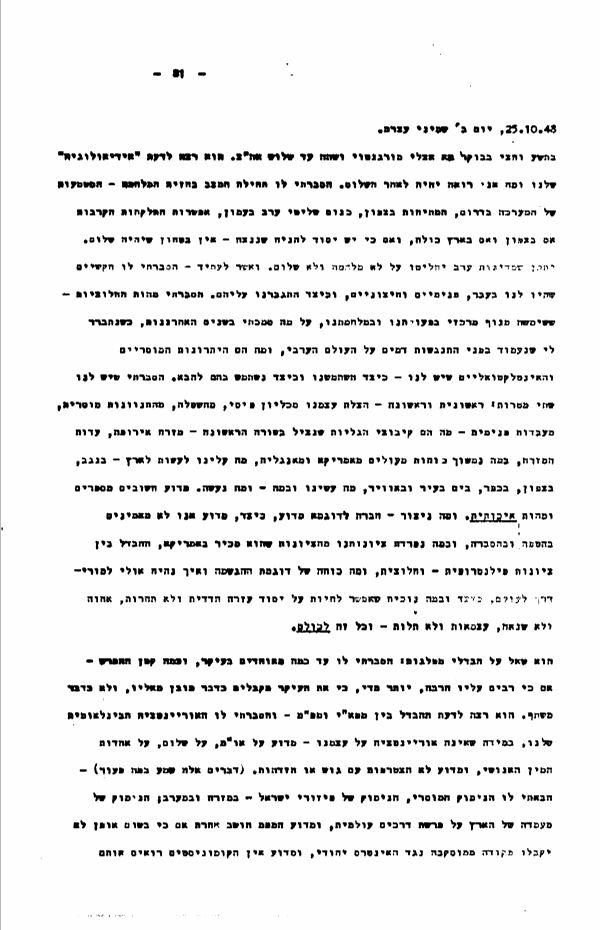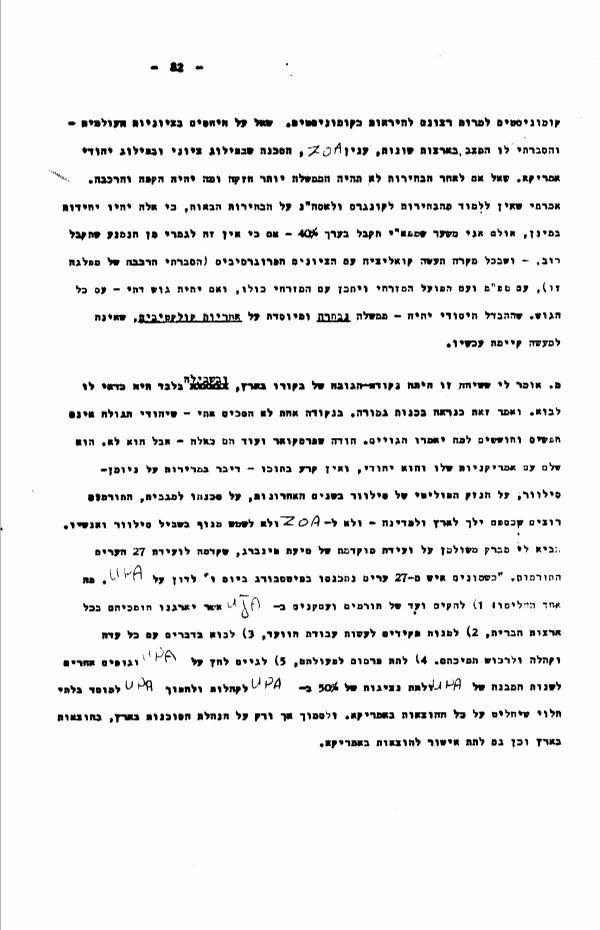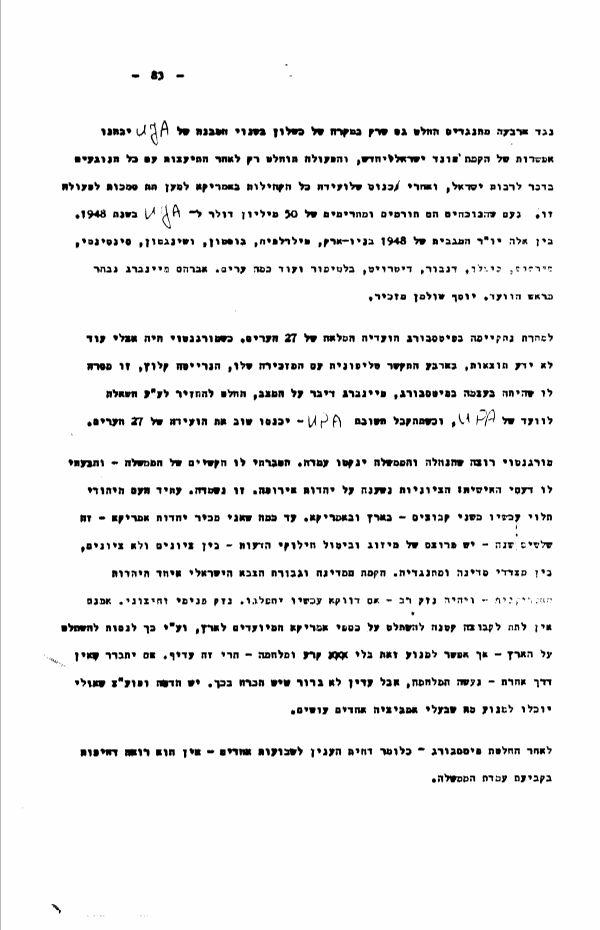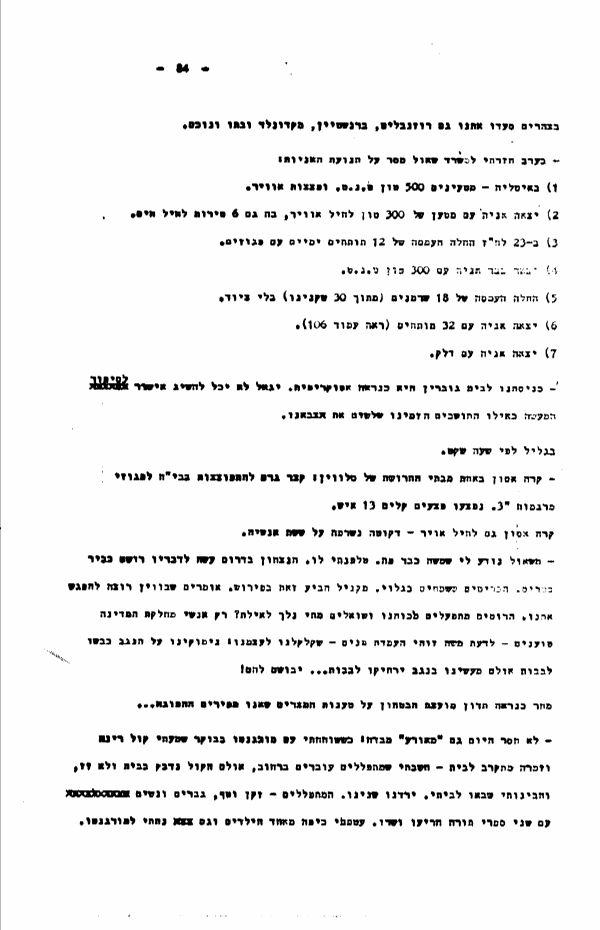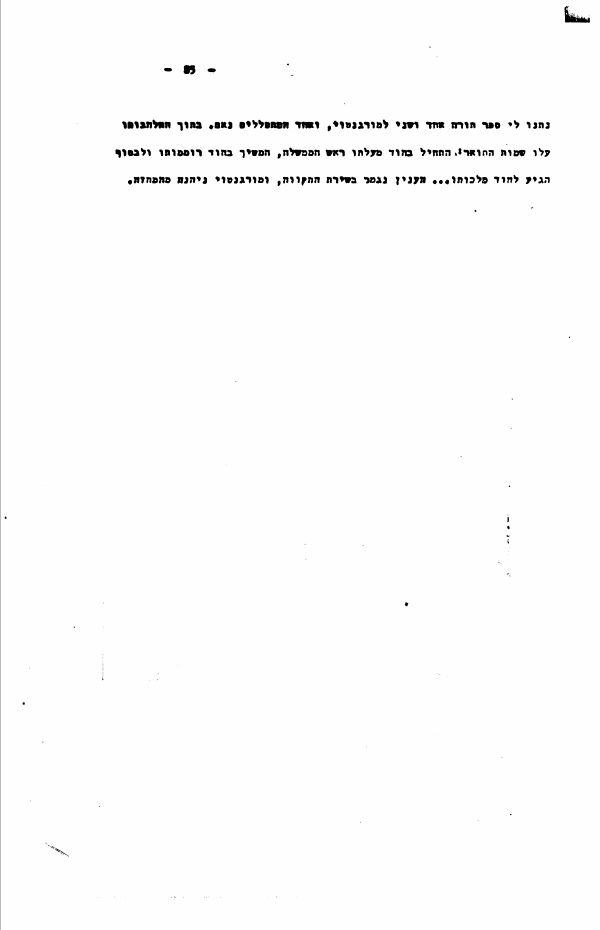1
of
Places:
Elat
United States
Moscow
Barak
Kannot
Pittsburgh
Kedma
Boston
Philadelphia
Baltimore, Maryland
Cincinnati
Bet Guvrin
Paris
Reh̠ov
Rayna
Amman
England
Buffalo
New York
Washington
Detroit
Denver
The use of the photograph is subject to the Copyright Law, 2007
24.10.1948
224895
Monday, October 25, 1948, Shemini Atzeret At 9:30 a.m. Morgenthau came to see me and stayed until 3 p.m. He wanted to know our “ideology” and what I foresee after peace. First I explained the situation at the warfront – the significance of the operation in the south, the tension in the north, the gathering of Arab leaders in Amman, the possibility of hostilities escalating, be it in the north or in the entire country, and although there’s a basis for assuming that we’ll win – there’s no guarantee that there will be peace. It’s possible that the Arab states will decide on neither war nor peace. And as to the future – I explained the difficulties, internal and external, that we’ve had in the past, and how we overcame them. I explained the essence of halutziyut [the Zionist pioneering spirit] – which was a main impetus in our activity and our warfighting, what I relied on in recent years, when it became clear to me that we would face a bloody clash with the Arab world, and what the moral and intellectual advantages we have are – how we’ve used them and how we’ll use them in the future. I explained that we have two goals: first and foremost – saving ourselves from physical annihilation, from degradation, from moral atrophy, from internal slavery. Which are the exiled [Diasporic] concentrations [communities] that we’ll save first? – Eastern Europe, the Eastern [Mizrahi] communities. How will we attract excellent forces from among immigrants from America and England, what must we do to the country? – In the Negev, in the north, in the countryside, in the city, at sea, and in the air, what we did, and with what – and what we will do. Why numbers and qualitative essence are important, and what we’ll create – a model society. Why? How? Why we don’t believe in preaching or hasbara [explanation, public relations], and what distinguishes our Zionism from the Zionism he knows in America, the difference between philanthropic Zionism – and halutzi [pioneering] Zionism, and the power of the model of actualization, and how we might become guides for the world, how and with what we will prove that it’s possible to live on the basis of mutual support rather than competition, fraternity rather than hate, independence rather than dependence – and all this for everyone. He asked about the differences among political parties. I explained how much [we’re] united in matters of principle, and how small the difference [separating us] is – although [we] fight over it a lot, too much, because the principle is taken for granted, rather than as something uniting. He wanted to know what the difference is between Mapai and Mapam – and I explained our international orientation, to the extent that it isn’t an orientation towards ourselves – why towards the UN, towards peace, towards the unity of humanity, and why [we] don’t join a bloc or alignment (he heard these things with his mouth agape) – I gave him the moral rationale, the rationale of Israel [the Jewish people] scattered in the East and the West; the rationale of the country being at a global crossroads, and why Mapam thinks differently although it would never take an order from Moscow that opposed the Jewish interest, and why the communists don’t see them as communists, despite their wanting to be seen as communists. He asked about relations within the global Zionist movement – and I explained the situation in various countries, the ZOA [Zionist Organization of America] issue, the danger of a split among [American] Zionists and a split among American Jews. He asked whether there wouldn’t be a stronger government after the elections, and what its breadth and composition would be. I said that one shouldn’t draw conclusions from the elections to the [Zionist] Congress and the Assembly of Representatives regarding the coming elections, because these will be one-of-a-kind, but in my estimation Mapai will receive about 40% – although it’s not impossible that it will receive a majority – and that in any event it will form a coalition with the [General] Zionists, the Progressives (I explained the composition of this party), with Mapam and with HaPo’el HaMizrachi, and possibly – with all of HaMizrachi, and if there’s a religious bloc – with the entire bloc. The fundamental difference will be – an elected government based on collective responsibility, which does not currently exist in practice. Morgenthau told me that this conversation was the high point of his visit to the country, and for this alone it was worth coming here, and it seems that he said this with complete sincerity. On one point he disagreed with me – that the Golah [exile, i.e., Diaspora] Jews aren’t free, and are afraid of “what the Gentiles will say.” He admitted that [Judge Joseph] Proskauer and others are like that – but he isn’t. He’s at peace with his Americanness and he’s a Jew, and there’s no rift within him. He spoke bitterly about [Dr. Emanuel] Neumann and [Abba Hillel] Silver, about Silver’s political damage in recent years, about the danger he poses to the UJA. The donors want their money to go to the country and the state – and not to the ZOA, and not to serve as leverage for Silver and his people. He brought me a cable from [Joseph] Shulman about a preliminary conference of [Abraham] Feinberg’s faction, in advance of the conference of 27 donor cities. About 80 people from 27 cities convened in Pittsburgh on Friday to discuss the UPA [United Palestine Appeal]. They unanimously decided 1) to establish a committee of donors and businessmen in the UJA [United Jewish Appeal] to organize their supporters throughout the United States, 2) to appoint administrators to carry out the committee’s work, 3) to hold talks with every community and congregation and obtain their support, 4) to publicize their activity, 5) to put pressure on the UPA and other bodies to change the structure of the UPA and allocate 50% of the representation in the UPA to communities [congregations?], and to transform the UPA into an independent institution that will decide on all the expenditures in America. And to rely solely on the [Jewish] Agency Executive in the country for expenditures in the country, and to grant permission for expenditures in America. Against four objectors it was also decided that only in the event of a failed restructuring of the UJA would they examine the possibility of establishing a new Israeli fund, and this action would be decided on only after consulting with all the relevant parties, including Israel, and after convening a conference of all the communities [congregations?] in America in order to grant authority for this action. It was estimated that those present were donors and fundraisers [who brought in] $ 50 million for the UJA in 1948. These included the chairmen of the 1948 fundraising campaigns in New York, Philadelphia, Boston, Washington, Cincinnati, Syracuse, Buffalo, Denver, Detroit, and a few other cities. Abraham Fienberg was elected as head of the committee, Joseph Shulman as secretary. On the following day the plenary conference of the 27 cities took place in Pittsburgh. When Morgenthau was with me [yesterday] he didn’t yet know the results. At 4 he telephoned his secretary Henrietta Klotz [sp.], who told him that she herself had been in Pittsburgh. Feinberg spoke about the situation, decided for now to refer the question of a committee back to the UPA, and when the UPA’s answer is received, the conference of 27 cities will be reconvened. Morgenthau wants the [Jewish Agency?] Executive and the government to take a stance. I explained the problems for the government – and expressed my personal opinion: Zionism rested on Europe’s Jewry, which was obliterated. The future of the Jewish people now depends on two concentrations – in the country and in America. To the extent that I know American Jewry – for 30 years now – there’s a process of merging and eliminating differences of opinion – between Zionists and non-Zionists, between supporters of the state and opponents of it. The founding of the state and the courage of the Israeli army united American Jewry, and a lot of damage – internal and external – will occur if they split now. Of course a small group shouldn’t be allowed to seize control of American money intended for the country, and thereby to try to take control over the country. But [if] this can be prevented without a rift and a war – then that’s preferable. If it turns out that there’s no other way – we’ll go to war, but it’s still unclear whether this is necessary. There are Hadassah and Po’alei Zion, which might be able to prevent what a few ambitious [individuals] are doing. After the Pittsburgh decision – that is, to postpone the matter for a few weeks – he sees no urgency in deciding the government’s position. In the afternoon Rosenblüth [Pinchas Rosen], [Peretz] Bernstein, [US Ambassador James] McDonald and his daughter, and [Charles] Knox [first secretary at the US embassy] also dined with us. – In the evening I returned to the office. Shaul [Avigur] reported on the ships’ movement: 1) In Italy – 500 tons of TNT and aerial bombs are being loaded. 2) A ship has departed with 300 tons of cargo for the air force, as well as 6 boats for the navy. 3) On the 23rd of the month the loading [onto a ship] of 12 naval cannons with shells began. 4) A ship with 300 tons of TNT has already departed. 5) The loading [onto a ship] of 18 Sherman [tanks] without equipment (out of 30 we bought) began. 6) A ship with 32 cannons (see p. 106) has departed. 7) A ship with fuel has departed. – Our entry into Beit Jubrin is apparently apocryphal [dubious]. Yigael [Yadin] cannot obtain verification of the story that two days ago the residents supposedly invited our army. In the Galilee at the moment things are calm. A disaster occurred at one of Slavin’s factories: an electrical short caused an explosion at a factory for 3” mortars. 13 people were lightly wounded. A disaster also occurred in the air force – a Dakota caught fire along with its six crewmen. – Shaul [Avigur] informed me that Moshe [Sharett] is already here. I telephoned him. The victory in the south, according to him, made a huge impression in Paris. The British are openly happy. McNeil expressed this explicitly. They say that Bevin wants to meet with us. The Russians marvel at our strength and ask: When will we go to Eilat? Only the [American] State Department people claim – in Moshe’s opinion this is a façade – that we’ve ruined things for ourselves: our rationales regarding the Negev conquered hearts, but our deeds in the Negev will drive hearts away … Let them revel! Tomorrow the Security Council will apparently discuss the Egyptian claims that we’re violating the truce… – We also didn’t miss out on an amusing “event” today: while I was speaking with Morgenthau this morning, I heard sounds of gaiety and singing approaching the house – I thought that worshipers were passing through the street, but the sounds stayed by my house without moving, and I realized they’d come to my home. Both of us went down. The worshipers – old and young, men and women, with two Torah scrolls, were cheering and singing. I grabbed a kippah from one of the children and gave one to Morgenthau too. They gave one Torah scroll to me and the second to Morgenthau, and one of the worshipers spoke. Amidst his enthusiasm there emerged adjectives: he began with “His Excellency the Prime Minister,” continued to “His Eminence,” and finally reached “His Majesty” … The affair ended with the singing of “HaTikva,” and Morgenthau enjoyed the performance.





